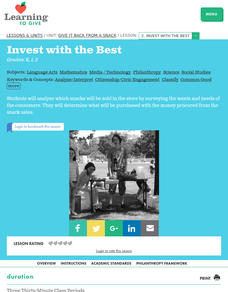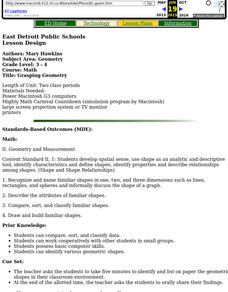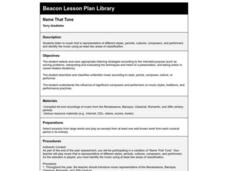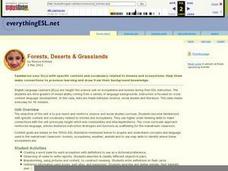Curated OER
Knowing Where You Are
Fifth graders research place names of one section of their state and create a chart to show their findings.
Curated OER
Risky Business
Students distinguish the attitudes of other students their age regarding whether or not they are concerned with contracting HIV and why they might have these attitudes.
Curated OER
Compound Word Match-Up
Second graders demonstrate an understanding of compound words. They create a compound word with a partner. In addition, 2nd graders correctly use their compound word in a written sentence.
Curated OER
Let's Clean the Beach!
Learners volunteer their time to clean a local park. They estimate the amount of debris they collect and make observations. They write a poem and draw an illustration about their experience.
Curated OER
The Four Sectors
Students examine the four sectors of society. They identify each business in the community as either a nonprofit, for-profit or governmental business. They discuss the importance of each sector to the community.
Curated OER
Give It Back From a Snack Lesson 2: Invest With the Best
Students survey schoolmate as to what type of snacks they would prefer to purchase. They graph the results and apply them to planning a classroom snack sale while examining what wants, needs, and consumers are.
Curated OER
Geology: Rock Hounds
Second graders read Byrd Baylor's book, Everybody Needs a Rock. In small groups, they examine rocks and list their characteristics. After writing down the descriptions on cards, the rocks are pooled together. Students then use the...
Curated OER
Grasping Geometry
Learners investigate geometric shapes in their environment, make a geometric design, and write paragraphs describing the design.
Curated OER
Multiple Intelligences and Holistic Models
Tenth graders identify different genres of literature and the characteristics which identify each genre. They identify which genres best suit their interests, read a novel and perform a skit from the novel or present original artwork...
Curated OER
Space Trading Cards
Students use the Internet and other reference sources to gather information on a space topic. They create a trading card displaying the information learned and import pictures from libraries and the Internet.
Curated OER
Understanding the Steps in a Process
Students read, "Center for Drug Evaluation and Research: FAQs", and discuss with questions embedded in the lesson plan.
Curated OER
The Food Web
Young scholars explore the role that the Arctic hare plays in the Canadian Arctic food web.
Curated OER
Name That Tune
Fourth graders listen to different types of music, then categorize them into two different areas of classification.
Curated OER
Are You a Peacemaker or a Man-Eating Shark?
Second graders work on the concept of fairness, then produce a page on the computer for a class book. They explain the difference between negative and positive behaviors in conflict situations.
Curated OER
Forests, Deserts, & Grasslands
Third graders complete activities to become familiar with the content and vocabulary related to biomes and ecosystems in order to mainstream into the classroom.
Curated OER
Fools Following the Fools
Learners read "The Winter's Tale" in Foole Upon Foole to determine the qualities the author used for a fool. Students role play the character to determine how volume affects the way a character is perceived. Learners determine the...
Curated OER
The U.S. Recognition of the State of Israel
Students research the political aspects of the U.S. position in the Middle East, considering, for example, Truman's position in view of the 1948 presidential election. They examine a telegram sent by the Secretary of State, George C....
Curated OER
Figurative Language
Students put poetic interpretations back together to explain the poem. Starting with cliches, students learn what various phrases mean. They analyze words, phrases and levels of meaning.
Curated OER
Sadorus Photograph Collection Activity: Analysis of an Historical Photograph
Learners retrive social, cultural, and historical information from a photograph by analyzing the contents. Data about the subject's culture, people, events, and place is explored.
Curated OER
Knowing Where You Are
Students work together to research the names of places in their state. They divide up their state so that each group can research a different section and complete a chart of the different names. They create a key for the map to explain...
Curated OER
The English Settle America
Sixth graders compare immigration today with that of the colonial period. They locate colonies on a map and describe reasons their families immigrated to the United States.
Curated OER
Titan and the Other Moons of Saturn
Students identify and describe the moons of Saturn. They sort the moons by their characteristics. They write a paragraph describing the moons to end the lesson.
Curated OER
"For The Birds" [part II]
Students examine how Chinese and Japanese artists used different kinds of birds
as representations of ideas that were important in both cultures and create their own birds using the technique of origami.
Curated OER
Five Senses-Introduction
Students explore the parts of the body that are used to develop the five senses. They conduct a nature walk. Students identify the things they see, hear, smell, and touch. They create a graphic organizer to organize their answers.
Other popular searches
- Classifying Triangles
- Classifying Quadrilaterals
- Classifying Polygons
- Classifying Organisms
- Classifying Rocks
- Classify and Categorize
- Classify and Categorizing
- Classify Living Things
- Classifying Angles
- Classify Triangles
- Classify 3d Shapes
- Classifying Objects
























!["For The Birds" [part II] Lesson Plan "For The Birds" [part II] Lesson Plan](http://content.lessonplanet.com/resources/thumbnails/122476/large/cgrmlwnvbnzlcnqymdeymtaxny0yoda5lwu0ew85zi5qcgc.jpg?1414222640)
